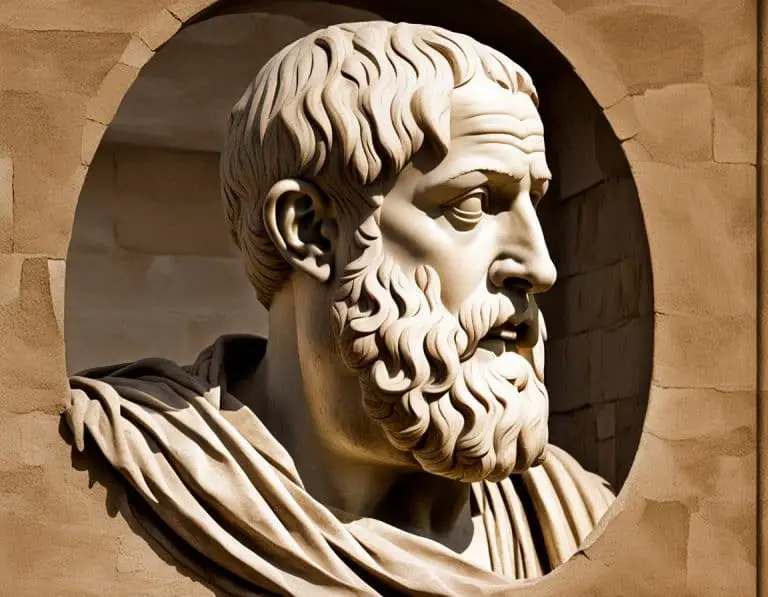Plato’s Vision of a PhilosopherKing
Plato’s vision of a philosopher-king embodies an ideal ruler who possesses both intellectual wisdom and moral virtue. In “The Republic,” he outlines how a philosopher-king would govern with justice, reason, and a deep understanding of the truth. This leader would rise above personal interests and desires, focusing solely on the well-being of the society as a whole. By combining philosophical insight with practical governance, the philosopher-king could steer the state towards a harmonious and virtuous existence.
Plato believed that philosophers were uniquely suited to rule because they pursued knowledge, sought truth, and possessed a love for wisdom. In his view, the ideal ruler should not be motivated by power or wealth but driven by a genuine concern for the greater good. By emphasizing the importance of wisdom and moral uprightness in leadership, Plato challenged conventional notions of governance and offered a radical alternative where the pursuit of truth and justice guided political decisions.
Examining the Relationship Between Military Virtue and Philosophical Wisdom
Scholars have long debated the intricate connection between military virtue and philosophical wisdom in Plato’s works. It is evident that Plato saw a direct correlation between the two, believing that a well-versed philosopher possessed the essential qualities to be a successful military leader. For Plato, the ideal ruler was not just a strategist on the battlefield but also a deep thinker who could navigate complex moral dilemmas with wisdom and integrity.
In Plato’s “Republic,” the character of the philosopher-king embodies this unique blend of military prowess and philosophical acumen. The ruler, guided by reason and virtue, was tasked with steering the state towards justice and harmony. This concept underscores Plato’s belief that a strong foundation in philosophy could enhance a leader’s decision-making capabilities in times of war and peace. The intersection of military virtue and philosophical wisdom in Plato’s writings continues to fascinate scholars as they explore the enduring relevance of these interconnected qualities in contemporary leadership and governance.
Plato’s Legacy in Military Philosophy
Plato’s legacy in military philosophy has left a lasting impact on how societies perceive the role of the military in shaping the governance and moral fiber of a nation. By emphasizing the importance of cultivating both physical prowess and intellectual acuity, Plato laid the foundation for a holistic approach to military leadership that transcends mere brute force. His belief in the philosopher-king as the ideal ruler reflects a deeper understanding of the intricacies involved in decision-making during times of conflict and peace.
Moreover, Plato’s insistence on the harmonious integration of military virtue and philosophical wisdom resonates with contemporary discussions on the ethical complexities of warfare and the moral responsibilities that come with wielding military power. His works continue to inspire military strategists and scholars to delve into the multifaceted nature of armed conflict, urging them to consider the broader implications of their actions beyond mere tactical victories. Plato’s enduring legacy serves as a reminder of the enduring relevance of integrating intellect and valor in the pursuit of a more just and enlightened society.
Tracing the Continuation of Plato’s Ideas in Contemporary Military Thought
Plato’s influence on contemporary military thought is both profound and enduring. His emphasis on the importance of education and training in producing well-rounded individuals resonates strongly with modern military leaders. The concept of a philosopher-king, as envisioned by Plato, continues to inspire discussions on leadership and governance within military hierarchies.
Moreover, Plato’s belief in the unity of military virtue and philosophical wisdom has shaped the way in which military strategists approach complex challenges. By integrating the principles of morality and rationality in decision-making processes, Plato’s ideas have provided a solid foundation for ethical leadership in the military. In essence, the ethos of courage, justice, and wisdom advocated by Plato centuries ago still holds relevance in shaping the values and practices of contemporary military institutions.
Plato’s Influence on Military Education
Plato’s influence on military education reverberates through the annals of history, making a lasting impact on the evolution of military training methods. His belief in the correlation between physical prowess and intellectual acumen laid the groundwork for a holistic approach to preparing soldiers for the rigors of warfare. By emphasizing the importance of a well-rounded education that includes both physical training and philosophical wisdom, Plato reshaped the way military leaders viewed the development of their troops.
Through dialogues such as “The Republic” and “The Laws,” Plato advocated for a structured educational system that instills discipline, critical thinking, and moral values in aspiring warriors. This emphasis on cultivating not only the body but also the mind has influenced military academies and training programs worldwide. Plato’s enduring legacy in military education serves as a testament to his foresight in recognizing the pivotal role of intellectual fortitude in shaping formidable and virtuous soldiers.
How Plato’s Works Inform Modern Approaches to Military Training
The influence of Plato’s works on modern approaches to military training cannot be overstated. His emphasis on the importance of rigorous education and discipline in cultivating virtuous soldiers resonates through the centuries. In Plato’s “Republic,” the concept of a well-ordered soul through education and training is directly applicable to the development of highly skilled and morally upright military personnel.
Furthermore, Plato’s advocacy for a balance between physical prowess and intellectual acumen serves as the foundation for contemporary military training programs. By recognizing the interconnectedness of mind and body, Plato’s teachings encourage a holistic approach to preparing soldiers for the challenges they may face in the field. Integrating philosophical wisdom with tactical expertise, modern military educators continue to draw inspiration from Plato’s timeless insights to shape well-rounded and resilient military professionals.
Related Links
Review of Plato’s Military Service and its Impact on his Philosophy
The Historical Significance of Plato’s Military Service
